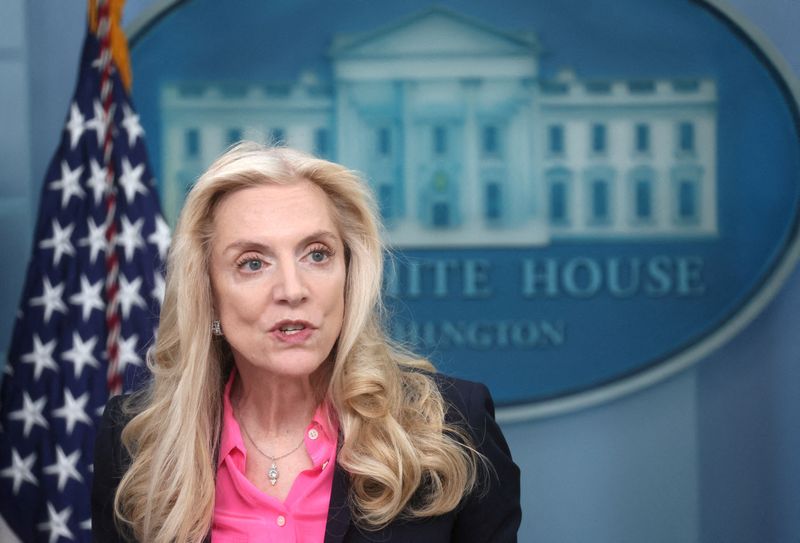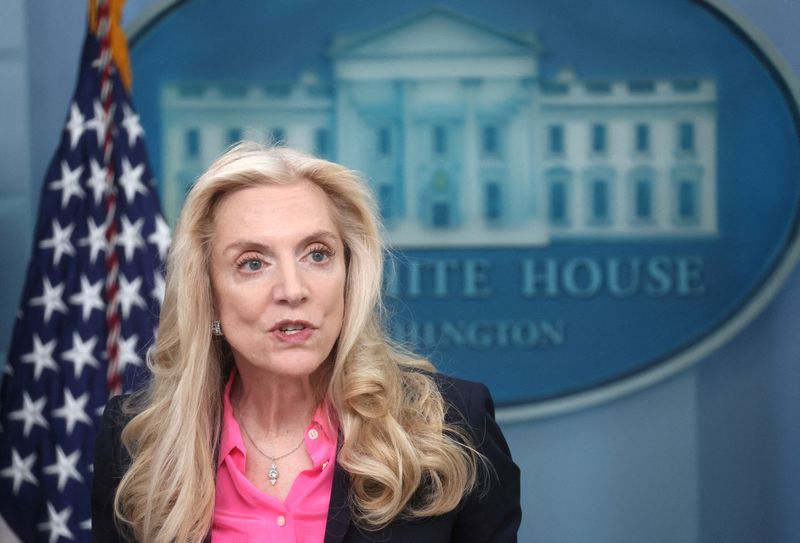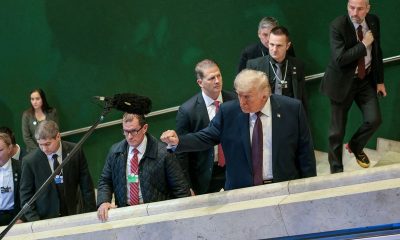Economy
US government shutdown would ‘undermine’ US economic progress, Yellen says


© Reuters. Director of the National Economic Council Lael Brainard speaks during a press briefing at the White House in Washington, U.S., June 27, 2023. REUTERS/Leah Millis/ File Photo
By David Lawder
WASHINGTON (Reuters) -A government shutdown that could start this weekend would “undermine” U.S. economic progress by idling key programs for small businesses and children, and could delay major infrastructure improvements, U.S. Treasury Secretary Janet Yellen said on Friday.
Yellen said in remarks at the Port of Savannah in Georgia that it was crucial that Republicans in the House of Representatives take action to keep the government open and adhere to a budget deal agreed in late May.
A shutdown of broad parts of the government would start on Sunday as the new fiscal year starts without new spending legislation from Congress. Chances of a shutdown increased on Thursday as the House pursued partisan spending cuts and the Senate advanced separate legislation to temporarily extend spending.
“The failure of House Republicans to act responsibly would hurt American families and cause economic headwinds that could undermine the progress we’re making,” Yellen said.
“A shutdown would impact many key government functions – from loans to farmers and small businesses, to food and workplace safety inspections, to Head Start programs for children. And it could delay major infrastructure improvements,” she said, adding that such investments boost economic growth.
Her comments echoed those of the White House’s top economic adviser, Lael Brainard, who said on Friday that a government shutdown was an “unnecessary risk” to a resilient economy now with moderating inflation.
Brainard told CNBC that avoiding a lapse in government funding was “completely in the hands of the House, the House Republicans in particular,” and that risks to the economy include active military service members going without pay, air traffic delays and poor Americans being unable to access government benefits.
Brainard said U.S. Commerce Department data showing underlying annualized inflation excluding food and energy fell below 4% for the first time in more than two years in August was “absolutely good news” for the economy.
“The main story of all the naysayers was that you couldn’t get core inflation to come down without a big increase in job destruction. That is not what we’ve seen,” Brainard said. “We’ve seen continued job creation and inflation at the core has come down into the range that we saw pre-pandemic.”
Brainard said a shutdown would take a toll on workers who would be asked to provide “essential services to the American people without pay.
“It’s a completely unnecessary risk to an economy that’s otherwise proven so resilient,” she said.
Economy
Russian central bank says it needs months to make sure CPI falling before rate cuts -RBC


© Reuters. Russian Central Bank Governor Elvira Nabiullina attends a news conference in Moscow, Russia June 14, 2019. REUTERS/Shamil Zhumatov/File Photo
MOSCOW (Reuters) – Russia’s central bank will need two to three months to make sure that inflation is steadily declining before taking any decision on interest rate cuts, the bank’s governor Elvira Nabiullina told RBC media on Sunday.
The central bank raised its key interest rate by 100 basis points to 16% earlier in December, hiking for the fifth consecutive meeting in response to stubborn inflation, and suggested that its tightening cycle was nearly over.
Nabiullina said it was not yet clear when exactly the regulator would start cutting rates, however.
“We really need to make sure that inflation is steadily decreasing, that these are not one-off factors that can affect the rate of price growth in a particular month,” she said.
Nabiullina said the bank was taking into account a wide range of indicators but primarily those that “characterize the stability of inflation”.
“This will take two or three months or more – it depends on how much the wide range of indicators that characterize sustainable inflation declines,” she said.
The bank will next convene to set its benchmark rate on Feb. 16.
The governor also said the bank should have started monetary policy tightening earlier than in July, when it embarked on the rate-hiking cycle.
Economy
China identifies second set of projects in $140 billion spending plan


© Reuters. FILE PHOTO: Workers walk past an under-construction area with completed office towers in the background, in Shenzhen’s Qianhai new district, Guangdong province, China August 25, 2023. REUTERS/David Kirton/File Photo
SHANGHAI (Reuters) – China’s top planning body said on Saturday it had identified a second batch of public investment projects, including flood control and disaster relief programmes, under a bond issuance and investment plan announced in October to boost the economy.
With the latest tranche, China has now earmarked more than 800 billion yuan of its 1 trillion yuan ($140 billion) in additional government bond issuance in the fourth quarter, as it focuses on fiscal steps to shore up the flagging economy.
The National Development and Reform Commission (NDRC) said in a statement on Saturday it had identified 9,600 projects with planned investment of more than 560 billion yuan.
China’s economy, the world’s second largest, is struggling to regain its footing post-COVID-19 as policymakers grapple with tepid consumer demand, weak exports, falling foreign investment and a deepening real estate crisis.
The 1 trillion yuan in additional bond issuance will widen China’s 2023 budget deficit ratio to around 3.8 percent from 3 percent, the state-run Xinhua news agency has said.
“Construction of the projects will improve China’s flood control system, emergency response mechanism and disaster relief capabilities, and better protect people’s lives and property, so it is very significant,” the NDRC said.
The agency said it will coordinate with other government bodies to make sure that funds are allocated speedily for investment and that high standards of quality are maintained in project construction.
($1 = 7.1315 renminbi)
Economy
Russian central bank says it needs months to make sure CPI falling before rate cuts -RBC


© Reuters. Russian Central Bank Governor Elvira Nabiullina attends a news conference in Moscow, Russia June 14, 2019. REUTERS/Shamil Zhumatov/File Photo
MOSCOW (Reuters) – Russia’s central bank will need two to three months to make sure that inflation is steadily declining before taking any decision on interest rate cuts, the bank’s governor Elvira Nabiullina told RBC media on Sunday.
The central bank raised its key interest rate by 100 basis points to 16% earlier in December, hiking for the fifth consecutive meeting in response to stubborn inflation, and suggested that its tightening cycle was nearly over.
Nabiullina said it was not yet clear when exactly the regulator would start cutting rates, however.
“We really need to make sure that inflation is steadily decreasing, that these are not one-off factors that can affect the rate of price growth in a particular month,” she said.
Nabiullina said the bank was taking into account a wide range of indicators but primarily those that “characterize the stability of inflation”.
“This will take two or three months or more – it depends on how much the wide range of indicators that characterize sustainable inflation declines,” she said.
The bank will next convene to set its benchmark rate on Feb. 16.
The governor also said the bank should have started monetary policy tightening earlier than in July, when it embarked on the rate-hiking cycle.

 Forex4 years ago
Forex4 years agoForex Today: the dollar is gaining strength amid gloomy sentiment at the start of the Fed’s week

 Forex3 years ago
Forex3 years agoUnbiased review of Pocket Option broker

 Forex3 years ago
Forex3 years agoDollar to pound sterling exchange rate today: Pound plummeted to its lowest since 1985

 Forex3 years ago
Forex3 years agoHow is the Australian dollar doing today?

 Cryptocurrency3 years ago
Cryptocurrency3 years agoWhat happened in the crypto market – current events today

 World3 years ago
World3 years agoWhy are modern video games an art form?

 Commodities3 years ago
Commodities3 years agoCopper continues to fall in price on expectations of lower demand in China

 Economy3 years ago
Economy3 years agoCrude oil tankers double in price due to EU anti-Russian sanctions























